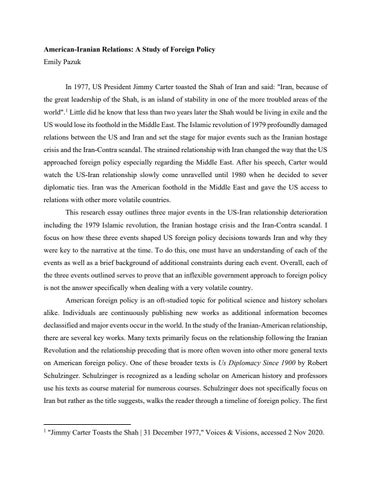American-Iranian Relations: A Study of Foreign Policy Emily Pazuk In 1977, US President Jimmy Carter toasted the Shah of Iran and said: "Iran, because of the great leadership of the Shah, is an island of stability in one of the more troubled areas of the world".1 Little did he know that less than two years later the Shah would be living in exile and the US would lose its foothold in the Middle East. The Islamic revolution of 1979 profoundly damaged relations between the US and Iran and set the stage for major events such as the Iranian hostage crisis and the Iran-Contra scandal. The strained relationship with Iran changed the way that the US approached foreign policy especially regarding the Middle East. After his speech, Carter would watch the US-Iran relationship slowly come unravelled until 1980 when he decided to sever diplomatic ties. Iran was the American foothold in the Middle East and gave the US access to relations with other more volatile countries. This research essay outlines three major events in the US-Iran relationship deterioration including the 1979 Islamic revolution, the Iranian hostage crisis and the Iran-Contra scandal. I focus on how these three events shaped US foreign policy decisions towards Iran and why they were key to the narrative at the time. To do this, one must have an understanding of each of the events as well as a brief background of additional constraints during each event. Overall, each of the three events outlined serves to prove that an inflexible government approach to foreign policy is not the answer specifically when dealing with a very volatile country. American foreign policy is an oft-studied topic for political science and history scholars alike. Individuals are continuously publishing new works as additional information becomes declassified and major events occur in the world. In the study of the Iranian-American relationship, there are several key works. Many texts primarily focus on the relationship following the Iranian Revolution and the relationship preceding that is more often woven into other more general texts on American foreign policy. One of these broader texts is Us Diplomacy Since 1900 by Robert Schulzinger. Schulzinger is recognized as a leading scholar on American history and professors use his texts as course material for numerous courses. Schulzinger does not specifically focus on Iran but rather as the title suggests, walks the reader through a timeline of foreign policy. The first
1
"Jimmy Carter Toasts the Shah | 31 December 1977," Voices & Visions, accessed 2 Nov 2020.

